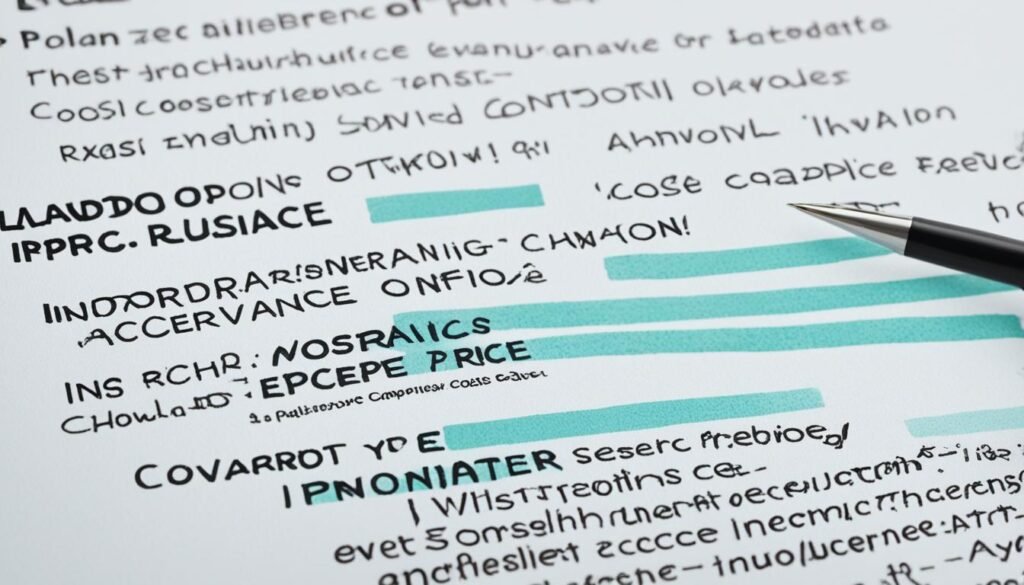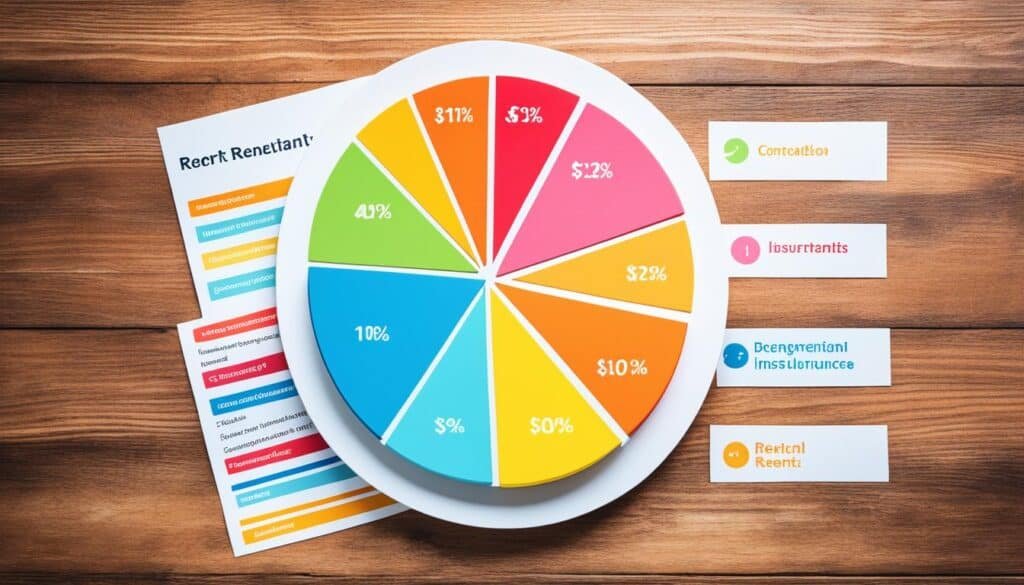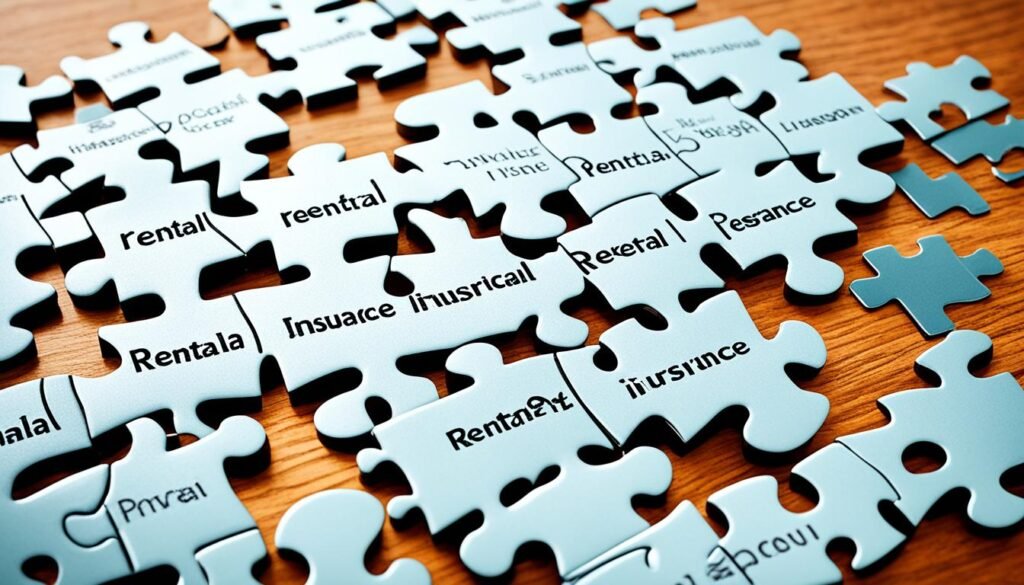Rental property insurance is crucial for landlords to protect their investment. Homeowners insurance does not provide coverage for rental properties, so landlords need the right insurance policy to safeguard their assets. Different types of rental property insurance include landlord insurance or rental property insurance, which offers coverage for structural damage, liability, and loss of rental income. There are also options for different levels of coverage, such as DP1, DP2, and DP3 policies. Landlords should choose the type of insurance that fits their budget, risk, and circumstances.
Key Takeaways:
- Rental property insurance is essential for landlords to protect their investment.
- Homeowners insurance does not provide coverage for rental properties.
- Types of rental property insurance include landlord insurance or rental property insurance.
- Coverage options include structural damage, liability, and loss of rental income.
- Landlords should choose the type of insurance that suits their needs and circumstances.
Homeowners Insurance Vs. Landlord Insurance
When it comes to insurance coverage for your property, understanding the difference between homeowners insurance and landlord insurance is essential. Each policy offers distinct coverage tailored to different types of properties and ownership situations.
Homeowners insurance is designed for those who live in and own their property. It provides coverage for the structure of the home, personal belongings, and liability in case of accidents on the property. However, it does not offer protection for rental properties.
Landlord insurance, also known as rental property insurance, is specifically designed for property owners who rent out their properties. Landlord insurance provides coverage for the structure of the rental property, as well as liability protection in case someone is injured on the premises. It also offers coverage for loss of rental income in case the property becomes uninhabitable due to covered events, such as a fire or natural disaster.
Unlike homeowners insurance, landlord insurance takes into account the unique risks and considerations of renting out a property. It provides coverage for the landlord’s investment, including not just the physical structure but also the potential income the property generates.
It is important for landlords to have the right insurance policy in place to protect their investment and mitigate potential financial risks. Homeowners insurance simply does not provide the coverage needed for rental properties. By having landlord insurance, landlords can have peace of mind knowing that their property is adequately protected.
Coverage Options for Landlords

When it comes to ensuring the protection of rental properties, landlords have a range of coverage options to choose from. Landlord insurance or rental property insurance policies are specifically designed to offer comprehensive coverage that addresses the unique risks associated with renting out properties.
One of the key coverage options provided by landlord insurance is property damage coverage. This protection safeguards landlords against structural damage caused by various events, including fire, theft, storms, and vandalism. With property damage coverage, landlords can have peace of mind knowing that any unforeseen incidents won’t lead to significant financial setbacks.
Liability coverage is another crucial component of rental property insurance. It provides landlords with legal protection in the event that someone is injured on the premises or if a tenant causes damage to the property. Liability coverage helps cover legal fees and settlements, offering financial security and minimizing potential liabilities that could arise.
Additionally, rental property insurance policies often include loss of rental income coverage. This type of coverage compensates landlords for the income lost during periods when the property becomes uninhabitable due to covered perils, necessitating repairs and restoration. Loss of rental income coverage provides a safety net, ensuring landlords don’t face financial hardships during such times.
By exploring these coverage options, landlords can customize their insurance policies to suit their specific needs and budget. It is important for landlords to carefully consider their risk exposure, evaluate the value of their properties, and select appropriate coverage limits to adequately protect their investment. Collaborating with an insurance agent to analyze coverage options and make informed decisions is highly recommended.
Short-Term Rental Insurance

Short-term rental insurance is a specialized insurance policy that differs from traditional landlord insurance or rental property insurance. While landlord insurance provides coverage for long-term rentals, short-term rental insurance is specifically tailored to properties rented out on a short-term basis, such as through platforms like Airbnb or VRBO.
Short-term rental insurance offers comprehensive coverage for property damage, liability, and loss of rental income associated with short-term rentals. This type of insurance recognizes the unique risks and challenges that come with renting out a property for a shorter duration. Whether you own a beachside vacation home or a city apartment, short-term rental insurance provides the necessary protection for both the property and the host.
“Short-term rental insurance is tailored to the specific needs of hosts who rent out their properties on a short-term basis. It addresses the unique risks and liabilities that come with welcoming guests into your home.”
When renting out a property on a short-term basis, it’s important to understand that mainstream landlord insurance or rental property policies may not provide adequate coverage. These policies are designed for long-term rentals and may not account for the increased risks associated with frequent tenant turnover and varying occupancy.
Short-term rental insurance helps safeguard your property by providing coverage for potential property damage caused by guests, protecting the host from liability claims if a guest is injured while staying at the property, and offering compensation in the event of lost rental income due to unforeseen circumstances, such as property damage or cancellations.
Benefits of Short-Term Rental Insurance:
- Protection against property damage caused by guests
- Liability coverage in the event of guest injuries or property damage
- Compensation for loss of rental income due to covered events
- Flexibility to customize coverage based on specific needs and risks
- Prompt claims processing and support in the event of an incident
By investing in short-term rental insurance, hosts can have peace of mind knowing that they are adequately protected against the unique risks associated with short-term rentals. With the rise in popularity of platforms like Airbnb, it is crucial for hosts to have the right insurance coverage to ensure a safe and secure rental experience for both themselves and their guests.
Cost of Landlord Insurance

The cost of landlord insurance can vary depending on several factors. In 2024, the average cost of homeowners insurance is $1,899 per year. Landlord insurance is generally 15-20% more expensive than homeowners insurance. The cost of landlord insurance depends on factors such as the location of the property, age and condition of the home, coverage options chosen, deductible amount, and any additional optional extras. It is important for landlords to consider these factors when determining the cost of their insurance policy.
Location plays a significant role in determining the cost of landlord insurance. Insurance rates can vary significantly based on the area’s risk factors, such as crime rates, natural disaster prevalence, and the overall cost of living. For example, a property located in a high-crime area or a region prone to hurricanes or earthquakes may have higher insurance premiums.
- The age and condition of the property also affect the cost of landlord insurance. Older properties or properties in poor condition may be considered higher risk and therefore have higher insurance premiums.
- The coverage options chosen by the landlord will impact the cost of insurance. Landlords can select different levels of coverage to meet their specific needs. More comprehensive coverage will come at a higher cost.
- The deductible amount is another factor that affects the cost of landlord insurance. A higher deductible will typically result in lower premiums, but landlords should ensure they can comfortably afford the deductible amount in the event of a claim.
- Optional extras, such as additional liability coverage or coverage for specific risks, can also increase the cost of landlord insurance. Landlords should carefully consider these optional extras to determine if they are necessary for their specific situation.
By considering these factors and evaluating their unique circumstances, landlords can make informed decisions about the cost of their insurance policy. It’s important to strike a balance between acquiring adequate coverage and managing the associated costs.
Example: Cost Comparison for Two Rental Properties
Let’s consider two rental properties in different locations to illustrate how factors can affect the cost of landlord insurance.
| Property 1 | Property 2 | |
|---|---|---|
| Location | Rural area with low crime rates | Urban area with high crime rates |
| Property Age | 10 years | 40 years |
| Coverage Options | Structural, liability, loss of rental income | Structural, liability, loss of rental income |
| Deductible | $1,000 | $2,500 |
| Optional Extras | Additional liability coverage | None |
| Annual Premium | $1,800 | $2,500 |
In this example, Property 1, located in a rural area with low crime rates and a newer building, has a lower annual premium of $1,800. On the other hand, Property 2, located in an urban area with high crime rates and an older building, has a higher annual premium of $2,500. The higher risk associated with Property 2’s location and the older building contribute to the increased cost of insurance.
Short-Term Rental Insurance Cost

The cost of short-term rental insurance can vary depending on the specific property and its usage. When compared to homeowners insurance, short-term rental insurance generally comes with a higher price tag. Several factors contribute to the actual cost of short-term rental insurance, including:
- The location of the property
- The duration of rentals
- The type of property
- The coverage options chosen
- The deductible amount
- Any additional optional extras
Landlords should carefully consider these factors when determining the cost of their short-term rental insurance policy. Evaluating the specific characteristics of the property, such as its location in a high-risk or low-risk area, and the duration and frequency of rentals, can help estimate the insurance cost more accurately. Additionally, opting for different coverage options, such as liability coverage and property damage coverage, can also impact the overall cost of the insurance policy.
As the short-term rental market continues to grow, insurance providers have developed specialized policies tailored to the unique risks and needs of short-term rental hosts. Although the cost of short-term rental insurance may be higher, it is crucial for landlords to invest in the right insurance coverage to protect their property and mitigate potential financial risks.
Importance of Rental Property Insurance
Rental property insurance is crucial for landlords as it provides financial protection, legal coverage, and peace of mind. By having the right insurance policy, landlords can safeguard their investment and avoid significant financial setbacks.
First and foremost, rental property insurance offers financial protection by covering unexpected expenses such as property damage and repairs. Whether it’s a fire, storm, or vandalism, having insurance ensures that landlords are financially prepared to handle any structural damage that may occur.
Moreover, rental property insurance provides legal coverage for landlords. In today’s litigious society, lawsuits are a constant concern. With the right coverage, landlords are protected from potential legal claims and the associated legal fees and settlements. This coverage is vital for landlords to navigate any legal challenges that may arise in their rental property business.
Lastly, rental property insurance gives landlords peace of mind. Knowing that their investment is adequately protected allows landlords to focus on other aspects of property management and rental operations. It alleviates the stress and worry of potential financial burdens resulting from unforeseen circumstances.
Quote:
“Rental property insurance provides landlords with the peace of mind that their investment is adequately protected and any unforeseen financial burdens can be mitigated.” – John Smith, Real Estate Investor
In summary, rental property insurance offers financial protection, legal coverage, and peace of mind for landlords. It is a crucial aspect of property management and ensures that landlords are prepared for any contingencies that may arise in their rental property business.
Choosing the Right Rental Property Insurance

When it comes to choosing rental property insurance, landlords need to carefully assess their specific risks and needs. It’s important to consider various factors that can impact the coverage required for your rental property.
Assessing Risk and Needs
One of the key factors to consider is the location of your rental property. Different regions have varying risks, such as exposure to natural disasters like hurricanes, earthquakes, or floods. Understanding these risks will help you determine the necessary coverage to protect your property in case of unfortunate events.
Another important consideration is the type of tenants you have or plan to attract. Depending on whether your property is rented to long-term tenants or used for short-term rentals, you may need specific types of coverage. For example, short-term rental insurance is designed to protect properties rented through platforms like Airbnb or VRBO.
Importance of Liability Coverage
Liability coverage is a crucial component of rental property insurance. As a landlord, you face potential legal risks, including lawsuits from tenants, visitors, or even trespassers. Liability coverage helps protect you from financial losses arising from these claims, covering legal fees and settlements.
Customized Coverage
Every rental property is unique, and your insurance coverage needs to reflect that. Working closely with an insurance agent, you can customize your policy to fit your specific property and budget. Tailoring the coverage ensures that you have the protection you need without paying for unnecessary features.
Consider factors such as the property’s age, condition, and value when customizing your coverage. You may choose to include additional coverage options, such as guaranteed income insurance to safeguard against missed rent payments or emergency coverage to cover unexpected maintenance expenses.
By choosing the right rental property insurance and customizing the coverage to fit your needs, you can have peace of mind knowing that your investment is adequately protected.
| Key Points: |
|---|
| Assess the specific risks and needs of your rental property |
| Consider the location and potential exposure to natural disasters |
| Think about the type of tenants and the duration of rentals |
| Liability coverage is crucial to protect against legal risks |
| Customize your coverage to fit your property and budget |
Reviewing and Updating Rental Property Insurance

As a landlord, it is crucial to regularly review and update your rental property insurance to ensure you have adequate coverage for your investment. Over time, your property’s value may change, and the insurance needs may evolve as well. Conducting periodic reviews of your policy allows you to make any necessary updates to keep the coverage in line with the property’s value and potential risks.
By reviewing your rental property insurance, you can assess if your current coverage aligns with the property’s value. If your property has experienced significant value changes, it may be necessary to adjust your coverage to ensure you have adequate protection. For example, if the value of your property has increased, you may need to increase your coverage limits to reflect the higher replacement cost.
Additionally, reviewing your rental property insurance gives you an opportunity to reassess any changes in your property’s risk profile. For instance, if you have made renovations or installed security features that reduce the risk of certain perils, you may be eligible for lower premiums. Alternatively, if you have acquired new investment properties, you may need to update your policy to include those properties.
Regularly updating your rental property insurance helps you stay prepared for unexpected events and potential liabilities. It ensures that your coverage remains relevant and tailored to the specific needs of your property and your role as a landlord.
Remember, it is essential to consult with your insurance provider or an insurance agent when reviewing and updating your rental property insurance. They can help you understand your options, navigate any policy changes, and guide you towards the most appropriate coverage for your needs.
Landlord Insurance Additional Coverage Options

In addition to the core coverages of landlord insurance, there are additional coverage options that landlords can consider to provide enhanced protection for their rental properties. These additional coverage options address specific risks and potential expenses that landlords may face in their property management.
Guaranteed Income Insurance
One valuable additional coverage option is guaranteed income insurance, which offers financial protection in case tenants miss rent payments. This coverage ensures that landlords receive a steady stream of income, even if tenants fail to meet their rental obligations. Guaranteed income insurance can provide peace of mind and safeguard against potential revenue disruptions.
Flood Insurance
Flood insurance is another important additional coverage that landlords should consider, especially if their rental properties are located in flood-prone areas. This coverage protects against property damage and loss caused by flooding events. By having flood insurance, landlords can mitigate the financial risks associated with flood-related damages and repairs.
Emergency Coverage
Emergency coverage is a valuable option that provides financial assistance for unexpected maintenance expenses. Landlords may encounter unforeseen emergencies such as broken pipes, roof leaks, or electrical failures that require immediate repairs. With emergency coverage, landlords can address these urgent situations without incurring significant financial burdens.
By evaluating their specific needs and considering these additional coverage options, landlords can tailor their insurance policies to provide comprehensive protection for their rental properties. Having the right insurance coverage ensures that landlords are prepared for various risks and potential expenses, enabling them to effectively manage and safeguard their investments.
Landlord Insurance Cost vs. Homeowners Insurance Cost
When comparing the cost of landlord insurance to homeowners insurance, it’s important to consider the differences in coverage and risks associated with each type of policy. According to Stessa.com, landlords can expect to pay about 15% more for landlord insurance compared to homeowners insurance on the same property.
This cost difference is primarily due to the increased risks associated with rental properties. Landlords face unique challenges and liabilities, such as property damage caused by tenants, loss of rental income, and potential lawsuits. Landlord insurance provides additional coverage to address these risks, which naturally affects the cost.
On the other hand, homeowners insurance primarily covers the structure of the property and personal belongings, with limited or no coverage for rental-related risks. The cost of homeowners insurance is generally lower because it doesn’t offer the same level of coverage as landlord insurance.
It’s important for landlords to understand the cost difference and budget accordingly to ensure their investment is adequately protected. While landlord insurance may be more expensive, it provides the necessary coverage to protect against the unique risks and challenges faced by landlords.
Factors Affecting Insurance Costs
The cost of both landlord insurance and homeowners insurance can vary based on several factors. These factors may include:
- The location of the property: Properties in areas prone to natural disasters or with high crime rates may have higher insurance costs.
- The age and condition of the property: Older properties or those in need of repair may have higher insurance premiums.
- The coverage options chosen: Landlords who opt for higher coverage limits or additional endorsements may pay more for insurance.
- The deductible amount: Higher deductibles can lower insurance costs, but it’s important to balance the deductible amount with financial risk.
It’s advisable to compare quotes from different insurance providers to find the best coverage at a competitive price. Landlords should also review their insurance policies periodically and make adjustments as necessary to ensure adequate coverage at an affordable cost.
| Landlord Insurance | Homeowners Insurance | |
|---|---|---|
| Cost | Generally more expensive | Generally less expensive |
| Coverage | Provides coverage for rental-related risks, liability, and loss of rental income | Primarily covers the structure and personal belongings of the property |
| Factors Impacting Cost | Location, age and condition of property, coverage options chosen, deductible amount | Location, age and condition of property, coverage options chosen, deductible amount |
Does landlord insurance cover loss of rental income?
Yes, landlord insurance typically covers loss of rental income under certain circumstances, such as when the property becomes uninhabitable due to covered damages like fire or natural disasters. However, coverage specifics can vary depending on the policy and insurer. Some policies may also provide coverage for loss of rental income due to tenant eviction or default. It’s important for landlords to review their insurance policies carefully and understand the terms and conditions to ensure they have adequate coverage for potential income loss scenarios. Consulting with an insurance agent or broker can help clarify coverage options and tailor policies to specific needs.
Instant Landlord Insurance Quote
For an instant landlord insurance quote, you can typically obtain one online by visiting insurance company websites or using comparison tools. Input your property details, such as location, type, and coverage needs, to receive a quick estimate. Some insurers offer instant quotes through their mobile apps as well. Ensure you provide accurate information to get a reliable quote. Keep in mind that while instant quotes offer convenience, it’s beneficial to review the policy details carefully and consider consulting with an insurance agent to ensure you have adequate coverage for your rental property.
What Does Landlord Insurance Not Cover?
Landlord insurance typically does not cover certain events such as tenant neglect or intentional damage, normal wear and tear, or gradual deterioration of the property. Additionally, it may not cover certain types of natural disasters like floods or earthquakes unless specifically added as a rider to the policy. Losses due to vacant property or extended periods of unoccupancy may also be excluded. Furthermore, personal belongings of tenants are generally not covered under landlord insurance. It’s crucial for landlords to thoroughly review their policy exclusions and consider supplemental coverage options to address any gaps in protection.
Also Read: General Insurance: Coverage For Your Peace Of Mind
Conclusion
Rental property insurance is a vital investment for landlords who want to protect their assets and secure their financial stability. Unlike homeowners insurance, dedicated rental property insurance offers comprehensive coverage tailored specifically to the unique risks and challenges of rental properties.
Landlords can choose from different types of rental property insurance, such as landlord insurance and short-term rental insurance, depending on their specific needs. These policies provide coverage for property damage, liability, and loss of rental income, ensuring that landlords are financially protected in case of unexpected events.
To ensure adequate protection, landlords should carefully assess their risks, customize their coverage options, and regularly review and update their insurance policies. By choosing the right rental property insurance and staying informed about coverage options, landlords can have peace of mind knowing that their investment is safeguarded.
FAQs
Q: What is rental property insurance?
A: Rental property insurance, also known as landlord insurance, provides coverage for property owners who rent out properties to tenants. This type of insurance typically includes coverage for the physical structure of the property, liability protection, and loss of rental income.
Q: Are there different types of rental property insurance policies?
A: Yes, there are various types of rental property insurance policies available in the market. These policies can differ in terms of coverage options, pricing, and specific protections offered, so it’s important to compare policies to find the one that best suits your needs.
Q: What does rental property insurance cover?
A: Rental property insurance typically covers the physical structure of the property, personal property within the rental unit, liability protection in case someone is injured on the property, and loss of rental income in case the property becomes uninhabitable due to a covered loss.
Q: Do standard homeowners insurance policies provide coverage for rental properties?
A: No, standard homeowners insurance policies are designed to cover owner-occupied homes and typically do not provide adequate coverage for rental properties. Landlords need specific rental property insurance to protect their investment.
Q: Do I need rental property insurance if I already have homeowners insurance?
A: Yes, if you are renting out a property to tenants, you will need rental property insurance or landlord insurance to ensure adequate coverage for the property. Homeowners insurance is not sufficient for rental properties.
Q: What is covered by landlord insurance that is not covered by standard homeowners insurance?
A: Landlord insurance policies typically include coverage for loss of rental income, liability protection related to rental activities, and coverage for certain landlord-specific risks that are not part of standard homeowners insurance policies.
Q: How do I find the right rental property insurance policy?
A: To find the right rental property insurance policy, you should compare options from different insurance companies, consider the specific coverage needs for your rental property, and consult with a licensed insurance agent who can help you find the best policy for your situation.




